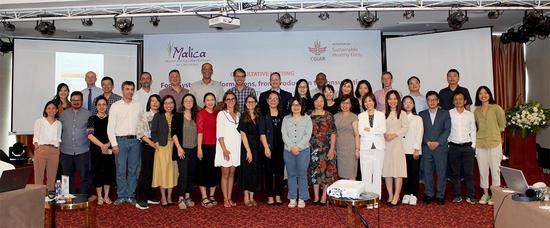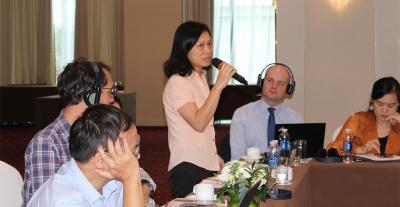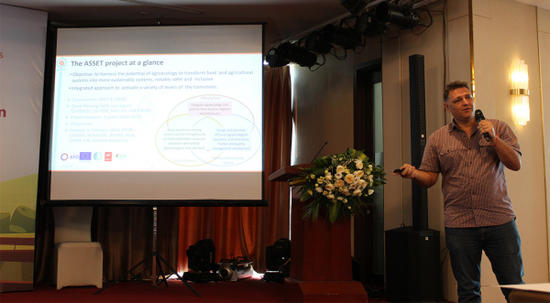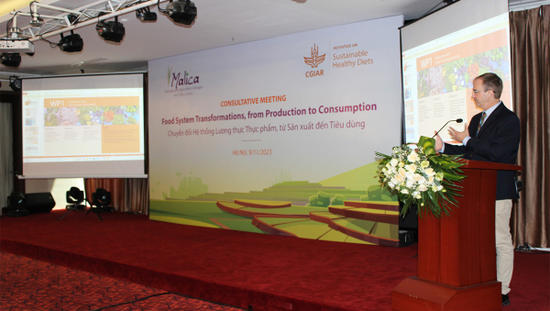Food System Transformations, From Production To Consumption: a consultative meeting on the future of food and agriculture in Vietnam
9 November, Hanoi - the collaborative platform on Markets and Agriculture Linkages for Cities In Asia (MALICA), in partnership with the Sustainable Healthy Diets through Food System Transformations (SHiFT) initiative, led a consultative meeting to address the objectives of the Vietnam's National Action Plan for Food System Transformation (NAP). In line with the NAP’s vision, the agenda facilitated multi-sectoral collaboration, aiming to improve Vietnam’s food distribution, policy, and consumption patterns, ultimately contributing to the nation's sustainable food future.
On November 9, at the Grand Vista Hotel, Hanoi, the consultative meeting on Food System Transformations, From Production To Consumption was organized by the platform Markets and Agriculture Linkages for Cities In Asia (MALICA) in conjunction with the initiative on Sustainable Healthy Diets through Food System Transformations (SHiFT), led by the Consultative Group on International Agricultural Research (CGIAR). The meeting aimed to share and discuss the SHiFT initiative's initial findings, highlighting the challenges and opportunities in achieving sustainable, healthy diets. The discussion sought a multi-dimensional, systemic approach to the nation's food systems.
The consultative meeting on Food System Transformations, From Production To Consumption gathered delegates from the research, public, and private sectors in the food system in Vietnam. © Linh Vo, CIRAD
The main organizers were represented by MALICA facilitator Dr. Michaël Bruckert, CIRAD, and Dr. Alan de Brauw, International Food Policy Research Institute (IFPRI)/CGIAR. They were joined by an esteemed cohort, including Ms. Bui My Binh from the International Cooperation Department of the Ministry of Agriculture and Rural Development (MARD), Ms. Truong Tuyet Mai from the National Institute of Nutrition (NIN), and Mr. Nguyen Thanh Tung, from the International Fund for Agricultural Development (IFAD), along with delegates from the research, public, and private sectors.
The National Action Plan in focus
The backdrop for the discussions was the National Action Plan (NAP), inaugurated in March 2023, to pivot Vietnam's food systems towards sustainability by 2030. The event was opened by Ms. Bui My Binh, who reaffirmed MARD's priority on facilitating international collaboration for a multi-sectoral Food System partnership. She noted local initiatives and the importance of COP28 for future agricultural and health policies, highlighting the need for expert guidance to refine strategies and action plans.
Ms. Bui My Binh, International Cooperation Department of the MARD, endorses initiatives such as MALICA and SHiFT as crucial in today's developmental and social landscape. © Linh Vo, CIRAD
The meeting started with a comprehensive review of the SHiFT initiative's early results, presenting findings on adolescents' dietary patterns and the anticipated interventions, leading to a broader exploration of the food supply chain and a landscape of the current policy's role in fostering healthier diets.
Dr. Pascal Lienhard, CIRAD, sharing insights from the ASSET project © Linh Vo, CIRAD
Following this, a collaborative session allowed for a deep dive into real-world experiences, discussing the impact of strategic policy reforms (Healthbridge) and the practicalities of food safety in markets (ILRI). Dr. Pascal Lienhard, CIRAD, concluded the second session by sharing insights from the Agroecological and Safe Food System Transitions (ASSET) project on the transformative power of agroecology on food systems in Vietnam. A spirited plenary discussion followed, with participants actively debating the challenges and potential of the initiatives presented.
Delegates from various sectors engaged in a dynamic exchange of experiences at the end of the presentation sessions © Linh Vo, CIRAD
Overcoming barriers in Vietnam’s food system transformation with insights from MALICA and SHiFT
The dialogue highlighted important challenges, notably the lack of a centralized food system authority. Dr. Michaël Bruckert, coordinator of the Malica platform, explains, "It's hard to have a holistic and systemic approach to the food system, as different ministries have different responsibilities in different sectors of the food system." This fragmentation hampers a unified and holistic approach essential for coherent action across agriculture, nutrition, and trade. Another hurdle is the knowledge gap in nutrition and food safety among business operators, which, coupled with the higher costs of nutritious foods, leads to consumer hesitation. "What I see as the main challenge is that the business people don't understand nutrition as well as they could," shared Dr. Alan De Brauw, IFPRI/CGIAR.
Dr. Alan De Brauw sharing the CGIAR-led initiative SHiFT’s initial findings on dietary patterns and food supply chain in Vietnam © Linh Vo, CIRAD
Addressing this, the NAP champions collaborative efforts among ministries for a unified vision and impact. According to Dr. De Brauw, further solutions may lie in tailoring approaches to the unique needs of urban and rural areas—educating retailers on the health benefits of their products and encouraging the promotion of nutritious foods to consumers, thereby enhancing the overall efficiency of the food supply chain.
MALICA, with two decades of experience in Southeast Asia, has been instrumental in shaping and operationalizing the NAP, offering a blend of research, advocacy, and policy support. Its evolution from focusing on urban agriculture and market linkages to embracing the entire spectrum of sustainable food systems, including production and consumption, has positioned it as a critical ally in Vietnam's food system transformation. Working closely with SHiFT, MALICA strives to facilitate a change in consumption patterns, improved food distribution, and influenced policy for healthier diets. Their joint efforts have been pivotal in organizing meetings that unite diverse stakeholders, fostering a platform where comprehensive strategies are crafted in line with the NAP's objectives. This cooperative approach aims to continue advancing discussions, sharing findings, and collectively steering Vietnam toward a sustainable food future.
(*) The National Action Plan (NAP), approved by Vietnam's Prime Minister in March 2023 (n° 300/QD-TTg), sets a framework for transforming the country's food systems by 2030, with a commitment to transparency, responsibility, and sustainability. It encompasses an ambitious agenda with five main tasks: policy reform, input supply, sustainable agricultural production, food processing and distribution systems, and sustainable consumption practices. The tasks are composed of 36 missions, of which 30 are assigned to the Ministry of Agriculture, signifying Vietnam's determination to balance food security with environmental protection and to ensure the affordability of safe, healthy diets for all its citizens.
© Linh Vo, CIRAD
Published: 10/11/2023





